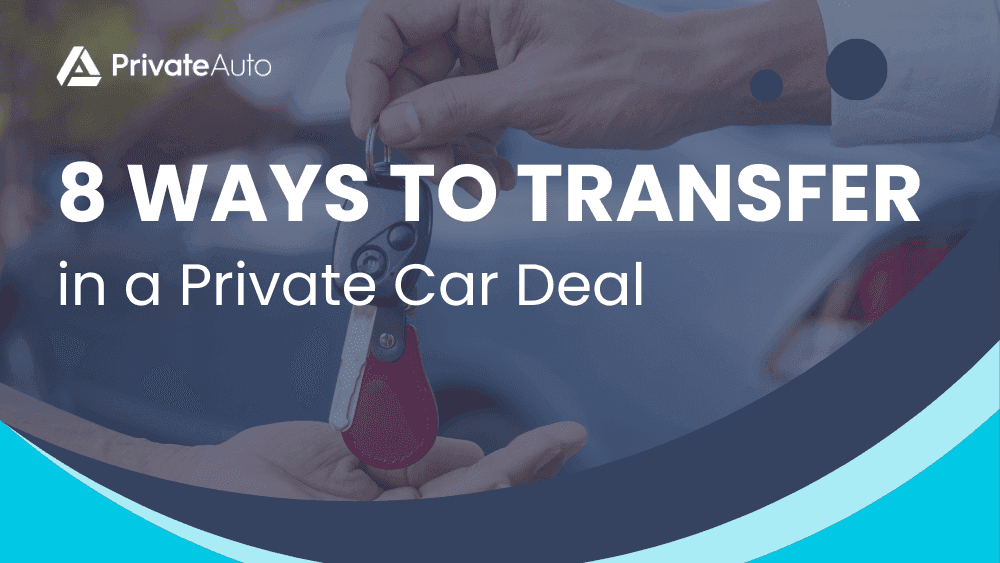8 Ways to Transfer Funds in a Private Car Deal
There are 8 ways to transfer funds in a private car transaction. All but one are inconvenient, slow, expensive, or risky.

PrivateAuto Pay is the only payment method that is instantaneous, secure, convenient, and fee-free.
One: Are Cash Transactions Safe?
If you've got the funds, paying the full sale price in cash can save you thousands of dollars in interest payments.
But lugging around a bunch of physical dollars can be a hassle, risky, and just plain awkward. Who wants to meet up with a stranger carrying $42,524 in bills to buy that Toyota 4Runner?
Here are the main drawbacks to using physical cash as a method of payment:
PrivateAuto Pay allows you to pay cash—digitally. All the benefits of physical cash, none of the drawbacks.
But lugging around a bunch of physical dollars can be a hassle, risky, and just plain awkward. Who wants to meet up with a stranger carrying $42,524 in bills to buy that Toyota 4Runner?
Here are the main drawbacks to using physical cash as a method of payment:
•
Trust: do you know the person you're dealing with? No one wants to risk getting scammed or robbed by a complete stranger.
•
Paperwork: do you know how to do the bill of sale and title transfer for your state? Will you have a record of the transaction in case the other party wants to contest it?
•
Inconvenient: ATMs and banks have withdrawal limits. If you’re trying to do it on the weekend, forget about the car.
PrivateAuto Pay allows you to pay cash—digitally. All the benefits of physical cash, none of the drawbacks.
Two: What About Bank Transfers?
Traditional bank wire transfers are packed with limitations.
1. Slow. Transfers can take days to fully process as buyers coordinate multiple transactions due to low account limits. This delays sales and frustrates sellers.
2. Potentially risky. Exposing your bank account details opens the door to fraud.
3. Fees. Bank wires often cost money.
1. Slow. Transfers can take days to fully process as buyers coordinate multiple transactions due to low account limits. This delays sales and frustrates sellers.
2. Potentially risky. Exposing your bank account details opens the door to fraud.
3. Fees. Bank wires often cost money.
Three: Are Private Checks a Good Form of Payment?
A personal check doesn’t fly for most sellers; no one wants to sit around waiting for it to clear.
Too many steps, too much trust needed, too much time wasted. What should be a quick peer-to-peer payment turns into a headache.
Too many steps, too much trust needed, too much time wasted. What should be a quick peer-to-peer payment turns into a headache.
Four: How About a Cashier Checks?
Cashier’s checks are more trustworthy than personal checks, but even they’re not bulletproof. Plus, they’re inconvenient.
Cashier’s checks can be forged, so the only way for the seller to be certain is to meet the buyer at the buyer’s bank and have the bank verify the funds. Skip the inconvenience and enjoy instant payments with PrivateAuto Pay. Round-the-clock availability means no banking hours restricting transactions.
Cashier’s checks can be forged, so the only way for the seller to be certain is to meet the buyer at the buyer’s bank and have the bank verify the funds. Skip the inconvenience and enjoy instant payments with PrivateAuto Pay. Round-the-clock availability means no banking hours restricting transactions.
Five: Can I Use Venmo or Paypal?
Peer-to-peer payment apps like Venmo and PayPal seem convenient, but they have transfer limits, fees, or both.
In contrast, PrivateAuto was designed specifically for high-value private-party car transactions:
While Venmo and PayPal work great for splitting bills, they’re unwieldy for buying a $33K Camry, to say nothing of a $100K Porsche. For a secure car payment solution with ironclad protections, choose PrivateAuto Pay.
•
Low sending limits are unsuitable for high-dollar transactions—Venmo has a $5K limit and PayPal has a $10K limit on personal accounts.
•
PayPal’s fees of 2-3% quickly add up on large payments.
In contrast, PrivateAuto was designed specifically for high-value private-party car transactions:
•
Send and receive up to $1 million instantly, no limits
•
Escrow-like safeguards
•
Encrypted data keeps your information safe
While Venmo and PayPal work great for splitting bills, they’re unwieldy for buying a $33K Camry, to say nothing of a $100K Porsche. For a secure car payment solution with ironclad protections, choose PrivateAuto Pay.
Six: Is Cash App Safe?
Cash App lets you send money via $cashtag, QR code, or phone number. But it has a $7,500 monthly transfer limit—too low for most car purchases. Just like Venmo, it's suitable for small private sales under a few thousand dollars. For anything more, Cash App won't cut it.
Seven: What about Google Pay and Apple Pay?
Google Pay seems convenient for quick payments using your Android phone. But this peer-to-peer app has significant limits for car purchases:
1. Transaction caps of $25,000 rule out high-value transfers.
2. Linking to credit cards rather than bank accounts adds the risk of fraud and chargebacks.
3. The lack of biometric login makes payments less secure.
While handy for small daily purchases, Google Pay just doesn't cut it for large private-party car transactions. For seamless payments with robust protections, choose PrivateAuto Pay.
Apple Pay provides a similar peer-to-peer payment functionality on iPhone and other Apple devices. However, it also imposes unsuitable restrictions for car sales:
1. Apple Pay transactions are capped at $10,000 per week.
2. The funds source must be a credit or debit card—no linking to bank accounts.
Convenient for average spending, Apple Pay falls short for big-ticket peer-to-peer auto sales. For payments with no limits and ironclad protections, PrivateAuto Pay is purpose-built for large private-party car transactions.
1. Transaction caps of $25,000 rule out high-value transfers.
2. Linking to credit cards rather than bank accounts adds the risk of fraud and chargebacks.
3. The lack of biometric login makes payments less secure.
While handy for small daily purchases, Google Pay just doesn't cut it for large private-party car transactions. For seamless payments with robust protections, choose PrivateAuto Pay.
Apple Pay provides a similar peer-to-peer payment functionality on iPhone and other Apple devices. However, it also imposes unsuitable restrictions for car sales:
1. Apple Pay transactions are capped at $10,000 per week.
2. The funds source must be a credit or debit card—no linking to bank accounts.
Convenient for average spending, Apple Pay falls short for big-ticket peer-to-peer auto sales. For payments with no limits and ironclad protections, PrivateAuto Pay is purpose-built for large private-party car transactions.
Eight: What is PrivateAuto Pay?
PrivateAuto Pay is the only safe, fee-free instantaneous, convenient, and contactless payment option for a used car transaction over $5,000. PrivateAuto Pay allows you to have escrow-like safeguards in the palm of your hand.
When it comes to buying and paying for your car, the benefits of PrivateAuto Pay include.
PrivateAuto Pay is great and all, but what if you're buying or selling on another platform? We have a solution for that. DealNow allows you close your own vehicle deal, anytime, regardless of where the vehicle is listed.
DealNow is so smooth, so safe, and so fast that you’ll never want to buy or sell a car without it.
When it comes to buying and paying for your car, the benefits of PrivateAuto Pay include.
•
PrivateAuto Pay is our built-in banking integration that enables instant, secure, and fee-free funds transfers up to $1M. It’s a dream come true for private sellers and buyers.
•
Your PrivateAuto Pay account is an FDIC-insured bank account you own, accessed via your PrivateAuto dashboard.
•
Instantaneous transfers enable real-time deals—no waiting or coordination. Close the deal when you meet for the test drive.
•
Instant payments work 24 hours a day, 365 days a year. No coordinating around banker’s hours.
•
Easily move money from your bank account to PrivateAuto Pay and vice versa. A balance transfer can be done 24/7/365.
•
No exchange of contact information or banking info—your sensitive info stays safe, protecting you from scammers.
•
Encrypted data protects you from hackers.
•
You can even buy a car remotely with our escrow-like safeguards.
PrivateAuto Pay is great and all, but what if you're buying or selling on another platform? We have a solution for that. DealNow allows you close your own vehicle deal, anytime, regardless of where the vehicle is listed.
DealNow is so smooth, so safe, and so fast that you’ll never want to buy or sell a car without it.
Payments FAQ
What’s the best way to pay for a car on eBay Motors?
eBay Motors has a lot of great inventory. Their transactional infrastructure? Not so great. When it comes time to pay for a car you found on eBay, we have the perfect solution.
Our DealNow feature lets use the PrivateAuto backend infrastructure to safely do your eBay deal. Simply invite the other person to join you on DealNow and enjoy PrivateAuto’s streamlined process, security, and instantaneous payments.
There's no need to mess with mailing checks or risky wire transfers on eBay. DealNow lets you wrap up your eBay Motors deal quickly and securely.
Our DealNow feature lets use the PrivateAuto backend infrastructure to safely do your eBay deal. Simply invite the other person to join you on DealNow and enjoy PrivateAuto’s streamlined process, security, and instantaneous payments.
There's no need to mess with mailing checks or risky wire transfers on eBay. DealNow lets you wrap up your eBay Motors deal quickly and securely.
How to verify a cashier's check is real?
What is the maximum amount for a cashier's check?
What’s the best way to pay for a car on Craigslist?
Is the any way to avoid paying dealership fees?
How do I buy a car with physical cash?
How much should I sell my car for?
Do I need an escrow service when buying a car privately?
What are the tax implications of buying a car in cash?
Further Reading
What are my rights when purchasing a car from a private seller?
What are some common car escrow scams?
How do i pay the seller if i'm buying an out-of-state car?
What is the cheapest way to buy a car?
What is the safest way to recieve a payment on Facebook Marketplace?
How do I sell a car without getting scammed?
How do I buy a car out of state?
How can I buy a car long distance?
What are some common car escrow scams?
How do i pay the seller if i'm buying an out-of-state car?
What is the cheapest way to buy a car?
What is the safest way to recieve a payment on Facebook Marketplace?
How do I sell a car without getting scammed?
How do I buy a car out of state?
How can I buy a car long distance?

Landon Epperly
Contributing Author
Landon Epperly is the Product Manager at PrivateAuto, where he thrives on turning innovative ideas into reality. With a deep passion for cars and boats, Landon combines his love for vehicles with his expertise in product development to enhance the online marketplace experience....

